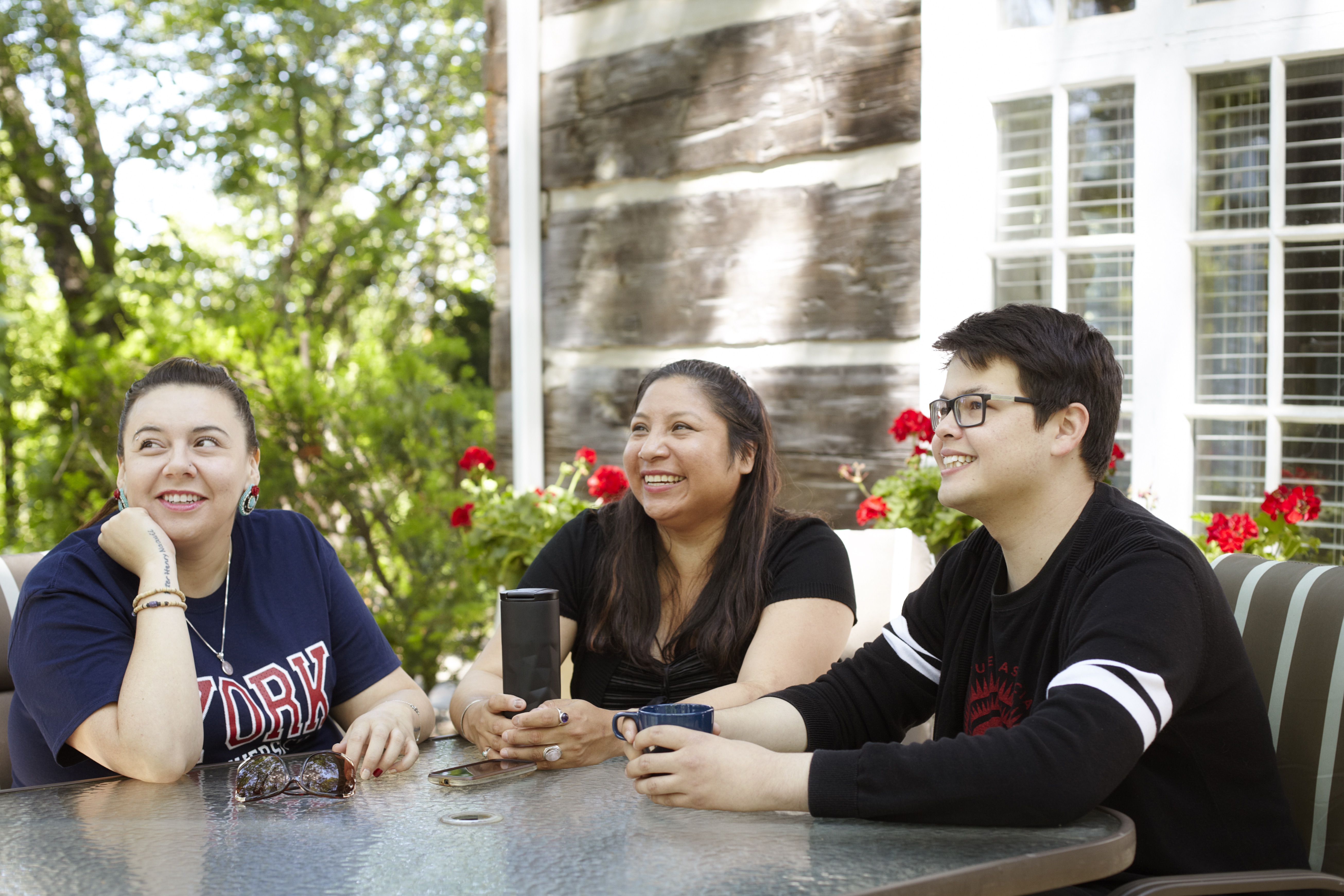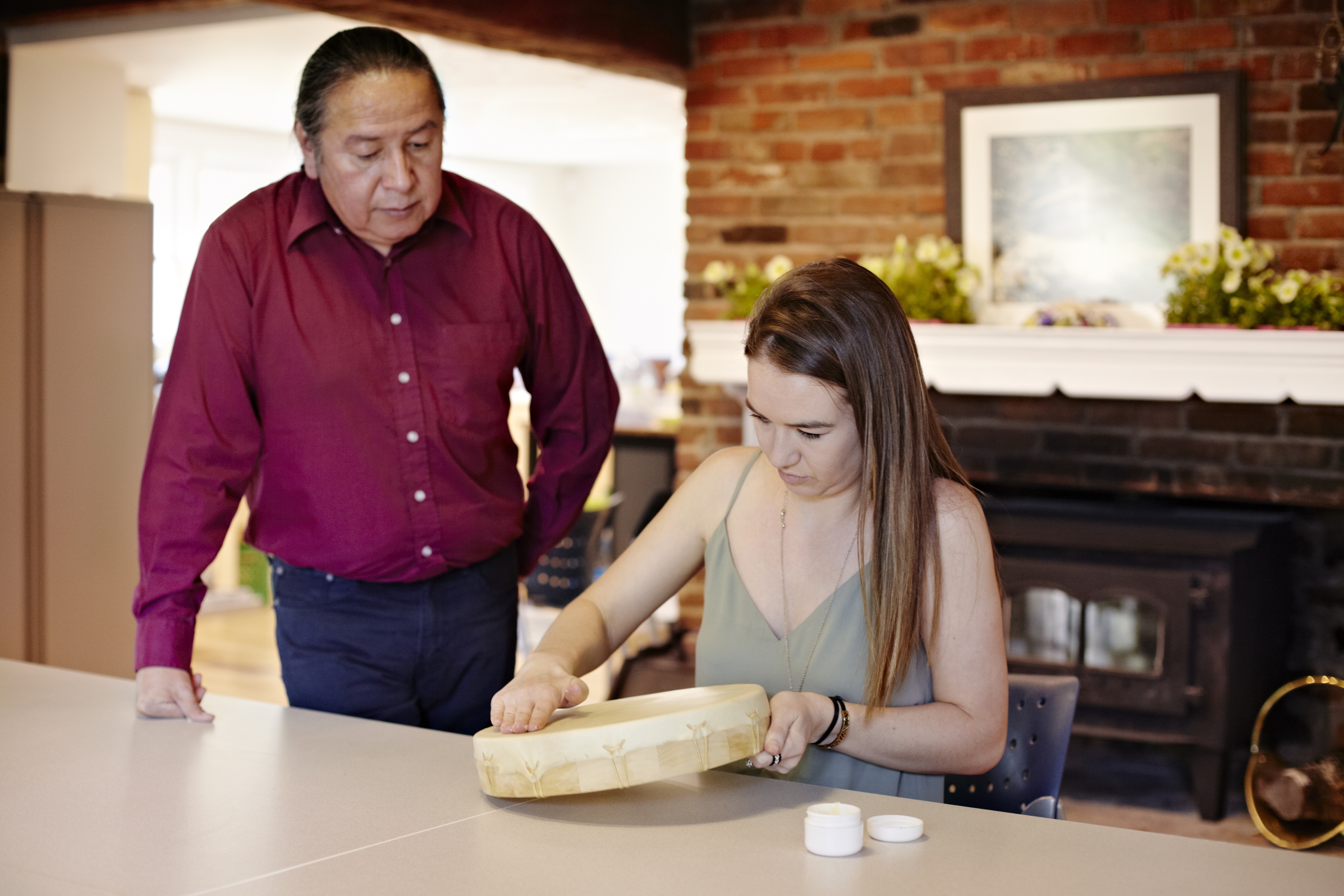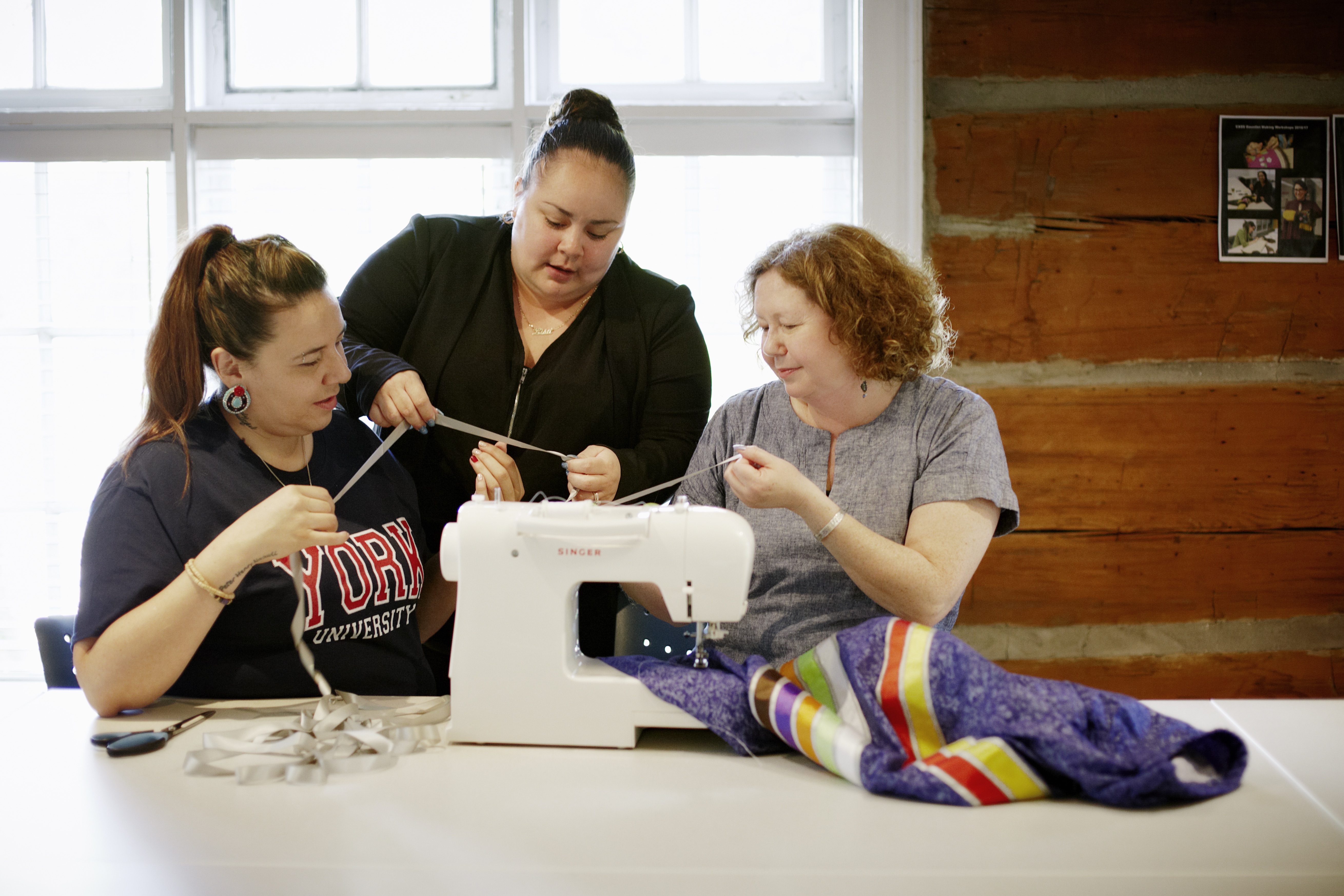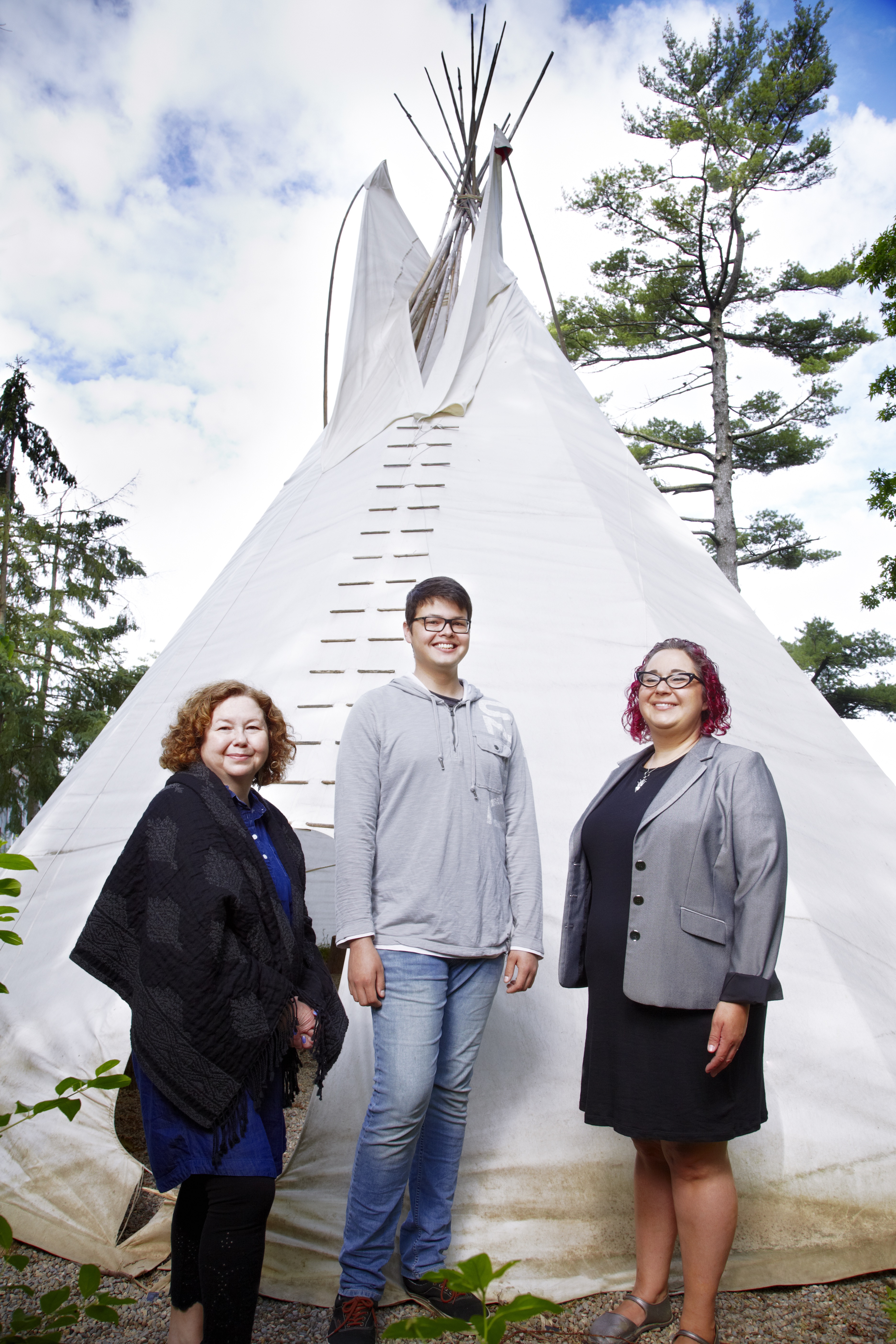The Indigenous Framework for York University: A Guide to Action 2017-19 Update
The Indigenous Framework for York University: A Guide to Action was endorsed by the Vice-President Academic and Provost in January 2017 and the Indigenous Council in March 2017. This snapshot of activities related to the goals of the Framework is intended to keep us focused on the priorities as outlined in the Framework and demonstrate the work that has begun toward full realization of its intent. The Framework was released to the York Community on November 7th, 2017.
In the two years since the release the Framework, Indigenous Council and other key stakeholders have participated in many Indigenization events. This report will utilize the 10 principles of the framework to discuss and evaluate this work. Our attempt is to be as holistic as possible, while acknowledging that there will be events and activities not captured in this report.
We have organized this report in line with the different principles outlined in the Framework. We acknowledge that many of the examples, projects, and events could be classified under multiple principles but for length and ease of reading, we have only included a topic once. We have included the full text for each principle in this report to make it easier to see the alignment.
This report is written by Ruth Koleszar-Green, Co-chair of the Indigenous Council and President’s Advisor on Indigenous Initiatives, and the office of the Vice Provost Academic, Alice Pitt and Lorna Schwartzentruber.
1 EXPAND THE ROLE OF THE INDIGENOUS COUNCIL (IC)
The IC was created in 2002 as a mandated body for universities that accept Indigenous funding. The IC has representatives from urban, First Nations, Métis organizations and communities and Indigenous faculty from the University. The IC is well positioned to provide guidance to the University in implementing Indigenous programming and curricula, and in hiring Indigenous faculty. The IC can play a pivotal role in helping to advance the University’s reconciliation and Indigeneity agenda; however, to do so, it should be included in the university’s governing bodies, such as the Board of Governors and the University Senate.
UPDATE:
-
Due to the expanding role of the IC there is a need to restructure. This restructuring is underway and started with an IC Visioning and Restructuring Retreat held on April 12, 2019 and a second retreat at the end of June. A draft document will be presented to the IC in September 2019.
-
In order to raise the profile of the Framework and demonstrate the commitment York University administration have made to Indigenization, the Framework was presented to Senate by Ruth Koleszar-Green and Alice Pitt, Vice Provost Academic, on April 23, 2019. The engagement and feedback were overwhelmingly positive and supportive of the work being done.
-
The IC has requested an invitation to provide a short presentation on their mission and mandate at all Faculty Councils and that Faculties with schools/ departments host a presentation in their Chairs and Directors meetings.
-
The IC has been requested to entertain/support/ endorse at least 8 internal and 3 external projects this past year. These have been as varied as the Ojibway Cultural Foundation Archiving Project in the Scott Library to hosting a Jane’s Walk on the Keele campus on May 3rd, 2018.
2 INCREASE THE NUMBER OF INDIGENOUS FACULTY
Indigenous Peoples represent 4.3 per cent of the Canadian population, but are woefully under-represented in terms of educational achievement at all levels. Currently systematic barriers exist; this is reflected in the National Occupational Classification (2015), which reports that Aboriginal Peoples represent 1.3 per cent of the availability pool for academic positions. Increasing the number of Indigenous faculty is important from an equity perspective; it will help create welcoming conditions for Indigenous students and transform educational institutions for all students. Indigenous faculty members bring culture, community and knowledge to the University; moreover, they strengthen curricular objectives and learning outcomes by offering advice in curriculum planning and implementation that non-Indigenous faculty members rely on. It is often argued that it is difficult to increase the number of Indigenous faculty because of the small pool of qualified Indigenous people available in Canada. While it is important to address the current systemic barriers and improve outcomes, the United Sates, by comparison, has significantly more Indigenous faculty. As such, the United States can be viewed as a place from where we can hire Indigenous faculty to help address our urgent need. Canada’s past shortcomings in educating Indigenous people should not be used as a reason to limit future opportunities.
UPDATE:
-
Since the endorsement of the Framework by the Vice President Academic and Provost in January 2017 eleven Indigenous faculty members (self-identified) have been hired into tenure track positions across 5 Faculties.
-
The 2018-21 Collective Agreement (Full title) designated 6 Indigenous faculty hires over the course of the Agreement.
-
Searches that were unsuccessful were re-authorized and some revisions to postings have potential to broaden the pool of qualified applications. The President’s Advisor on Indigenous Initiatives advised, educated and participated to varying degrees on 6 candidate searches. This included coaching hiring committees to increase their understanding regarding hosting candidates, reading and questioning Indigenous files and interview protocols.
-
A search for a Tier 1 Canada Research Chair (CRC) in Indigenous History of North America was implemented but unsuccessful. A new search for a Tier 2 CRC has been completed successfully. The President’s Advisor on Indigenous Initiatives sat on the search committee.
-
A working definition of Indigenous (Aboriginal) Scholars for targeted Indigenous faculty hires was developed. The purpose is to provide clarity and consistency in pan-university hiring and how York will determine eligibility under this hiring program. In line with the Federal Contractors Program, self identification as a First Nation, Inuit or Metis person, along with the rules for eligibility to work in Canada was considered.

3 ENHANCE THE RECRUITMENT AND ACADEMIC SUCCESS OF INDIGENOUS STUDENTS
Programs should focus on proactive recruitment of Indigenous students, the admissions process, financial accessibility, academic supports, and wellness of Indigenous undergraduate and graduate students. Recruitment and retention strategies should be developed in collaboration with CASS, the Faculty of Graduate Studies, other offices, and Indigenous political, territorial and treaty organizations.
UPDATE:
-
A variety of recruitment strategies were implemented:
-
The Aboriginal Post-Secondary Information Program (APSIP) held 88 separate events during October and November 2018 resulting in 3491 prospective learner contacts;
-
York central recruitment created space and focus for special APSIP engagement during recruitment events including Fall Campus Day, Spring Open House, 4 GTA Applicant receptions, and the Ontario Universities Fair;
-
Community and School visits included school-based Pow Wows, “Opportunity Knocks” Indigenous Youth Conference and community Career Fairs;
-
In April 2019 CASS and Faculty of Graduate Studies hosted the inaugural Indigenous Graduate Student Applicant reception at Skennen’kó:wa Gamig, Keele Campus;
-
In 2019 York had 520 applicants from 369 self identified Indigenous applicants. York offered admissions to 296. Eighty-eight accepted their offer of admission.
-
An admissions access pathway for Indigenous applicants was established that includes the opportunity to submit a personal statement to accompany and have considered as part of their application. The arrangement is structured so that the CASS recruitment officer will be in close contact with admissions assessors to provide guidance and advocacy in the decision-making process for those applicants who submit a personal statement.
-

4 EXPAND INDIGENOUS PROGRAMMING AND CURRICULAR OFFERINGS WHICH EXPLORE INDIGENOUS LIFE, CULTURES AND TRADITIONS
Most Faculties at York have developed Indigenous programming, some are more developed than others and, in some instances, Indigenous programming does not exist. As a priority, the University should conduct an in-depth review to identify and address gaps in existing programs and opportunities for new programs with an Indigenous focus. Indigenous languages have been systematically eradicated, as such; the University should intensify its efforts to provide access to Indigenous languages and align with the goals of reconciliation.
UPDATE:
-
In November 2018 the IC hosted the 1st Community Engagement Session for the Indigenous Framework on the theme of Teaching & Learning. The session was co-hosted by Ruth Koleszar-Green and Alice Pitt. The keynote speakers were Dr. Pamela Toulouse (Laurentian) and Tanya Senk (Toronto District School Board Indigenous Education Centre). Over 150 individuals attended the session. President Lenton responded to the keynote talks. The primary themes coming out of this Community Engagement session on Teaching and Learning* were:
-
Systemic change to support the advancement of Decolonization and Indigenization;
-
Visibility of Indigenous Peoples, knowledges and territories on campuses;
-
Education for faculty, staff and students and access to Indigenous Knowledge (a future project will be the creation of Knowledge Bundles to facilitate technological access to Indigenous knowledges);
-
Mentorship to Indigenous faculty, students, and staff;
-
Student supports beyond recruitment with more focus on retention;
-
Importance of Indigenous knowledges to research (was the topic of the 2nd Community Engagement Session);
-
-
The new Indigenous Studies Program in the Department of Equity Studies was launched in October 2018 with a community event that was attended by over 125 people.
-
Wabaan Indigenous Teacher Education, Faculty of Education had its first cohort in January 2019, with 24 students. This first cohort was celebrated with a community launch at the Toronto District School Board’s Indigenous Education Center in May 2019.
-
In September 2018, the Faculty of Education welcomed 6 new PhD students in the Indigenous PhD Student Cohort;
-
The Indigenous faculty members and students in the School of Social Work created a sweat lodge and held 4 ceremonies in 2018-19;
-
An Indigenous Research course at the PhD level in Gender, Feminist and Sexuality Studies was developed and delivered in summer of 2019;
-
The School of Social Work implemented 2 mandatory courses, one at the Bachelor and one at the Master level, to reflect on the history and impacts of colonization and develop student understanding of the potential for Indigenous communities to provide the appropriate solutions to collective healing and to satisfy accreditation requirements
-
Osgoode Law School implemented it’s first year of a new degree requirement which requires all students in the JD program to take one of a group of designated courses addressing Aboriginal law and Indigenous law.
5 FACILITATE RESEARCH THAT IS A RELEVANT TO
INDIGENOUS LIFE, AND RESPECTS INDIGENOUS APPROACHES
TO KNOWLEDGE AND LEARNING
Focus should be placed on policy, economic and legal areas that shape Indigenous experience. Collaboration is needed in exploring Indigenous and non-Indigenous approaches in these areas, as well as making room for Indigenous research and/or Indigenous forms of disseminating research. Research should include a commitment to listening to and learning from Indigenous Peoples’ knowledge, ecology, spiritual practice and experience. All Faculties, divisions and organized research units can play a role in this.
UPDATE:
-
Office of the Vice President Research and Innovation (VPRI) hosted a consultation on their Strategic Research Plan (Fall 2017) to integrate Indigenous research approaches, knowledge’s and practices. This resulted in the inclusion of Indigenous Futurities language in the plan.
-
Two new research funds were established in the Office of the VPRI:
-
York U Scholarly Event and Activities Grant 2018- 19, 7 projects, $9,400;
-
York U Indigenous Incentive Grant is still awaiting applications;
-
-
VPRI created a 6-session decolonization workshop to support research services’ understanding and engagement with the framework.
-
Dr. Sean Hillier, Indigenous faculty member, facilitated a VPRI project on the experiences of Indigenous and non-Indigenous faculty doing Indigenous research.
-
The IC hosted its 2nd Community Engagement Session on Research on April 16, 2019. The keynote speaker was Dr. Carrie Bourassa. The co-hosts of the Community Engagement Session were Dr. Deborah McGregor and Dr. Celia Haig-Brown. This session was attended by 150 York community members. The main themes coming out of the Community Engagement session on Research* were:
-
Participants felt that they have a responsibility to learn broadly about Indigeneity and not just as a response to research. There was an expectation that participants had of themselves to learn more about history, current realities and how that impacts scholarship and research;
-
Participants understood that there was a responsibility to understand Indigenous research processes and protocols;
-
There were questions about how to decolonize research grant applications, funding structures and dismantle barriers to research funding for Indigenous communities/projects;
-
Some participants came to the session to learn more about the Framework as a complete document;
-
There were also numerous mentions toward advancing teaching and learning (teaching and learning was the topic of the first community engagement session);
-
6 ENGAGE WITH INDIGENOUS COMMUNITIES TO ENRICH
University courses should incorporate Indigenous content into the curriculum; this can open up opportunities for experiential learning. An excellent example of such educational learning experiences is Osgoode Hall Law School’s Anishinaabe Law Camp, which started in the fall of 2014. The annual camp involves Indigenous and non-Indigenous students who travel to Neyaashiinigmiing (Cape Croker, Ont.) for a four-day weekend exploring Indigenous approaches to law and its connections to the cultural life of the community. Other Faculties have explored or are exploring similar programs that are relevant to their disciplines, either within or outside their formal degree programs.
UPDATE:
-
The Indigeneity in Teaching and Learning Fund from the Office of the Vice Provost Academic, supported a variety of activities to enhance teaching and learning through engagement with Indigenous artists, educators, speakers and knowledge keepers.
-
2016-17, 14 projects, $21,150
-
2017-18, 9 projects, $24,497
-
2018-19, 9 projects, $14,625
-
-
Since the release of the Framework, it has been observed that requests and engagement on Indigenous topics has increased drastically. It has become difficult to satisfy requests, and the Indigenous Council is working on a protocol to co-ordinate requests.
-
Osgoode Law School has partnered on 2 Anishinaabe Law Camps, 1) with Chippewas of Nawash Unceded First Nation for 1st year students, and 2) Chippewas of Rama First Nation for 2nd year students.

7 ESTABLISH SPACES FOR INDIGENOUS CULTURES
Space in this context refers to physical as well as linguistic spaces, and spaces within existing ceremonies, such as convocation, where Indigenous life at York can flourish. CASS, the Tipi in front of Skennen’kó:wa Gamig, the renovation of Skennen’kó:wa Gamig, and the proposal for specific practices and ceremonies for Indigenous students are examples of how this commitment can be (and has been) put into action at York.
UPDATE:
-
The establishment of space for Indigenous cultures and community has included a diverse set of projects.
-
In April 2019 President Lenton, Ruth Koleszar-Green and Ijade Maxwell-Rodrigues met with Chief R. Stacey LaForme to start a conversation and relationship between York University and Mississaugas of the Credit First Nation.
-
In May of 2019, CASS and Indigenous Council purchased and hosted an event to raise and celebrate the new Tipi.
-
In response to the building of the Sweat Lodge on the grounds adjacent to Skennen’kó:wa Gamig, a permanent fire permit was secured for ceremonies in the Lodge, the Tipi and around Skennen’kó:wa Gamig.
-
The Indigenous Council and other York spaces supported the annual student-led week of Indigenous activities in March of both 2018 and 2019. These events included an Inuit Feast, Metis Jigging and a First Nations Pow Wow.
-
In March of 2018 York hosted a series of events on both Glendon and Keele campuses to educate the community on Missing and Murdered Indigenous Women, Girls and Two Spirited people. The week of events included two keynotes (one on each campus) and a panel of Indigenous women articulating the importance of knowing the impacts of gendered colonial violence. There was broad collaboration across the campuses that included our own installation of the Red Dress Project. The week included events by the Indigenous Students Association at Glendon, Aboriginal Students Association at York, the President’s Office, The Centre for Aboriginal Student Services, Sexual Violence Response Office and the Indigenous Council.
-
Started conversation to engage Ceremonies and Convocation to include Anishnaabemowin language for the national anthem at all ceremonies at York
-
Osgoode Law School hired a new Program Manager of Indigenous Initiatives.
-
Osgoode Law School continues to host their annual Honour Ceremony for Indigenous students and Wahkowtowin Tea and Bannock community building event;
-

8 ENSURE THAT THE PERCEPTIONS AND EXPERIENCES OF INDIGENOUS COMMUNITY MEMBERS ARE REFLECTED IN THE CLASSROOM, ON CAMPUS AND IN UNIVERSITY LIFE
There should be university wide educational and professional development opportunities for students, faculty and staff, about Indigenous world views to help foster a culture of inclusion. This will help to combat discrimination and stereotypes. Protocols should be established to acknowledge traditional Indigenous territories and to invite Indigenous community members to participate in university life at York; this includes recruitment and retention of University staff from Indigenous communities.
UPDATE:
-
In May 2019, Indigenous and non-Indigenous York community members co-hosted a Jane’s Walk exploring the Indigenous presence on campus. The community walk engaged over 35 internal York and external community members.
-
A University wide policy on Smudging and Pipe Ceremonies is in process. A broad cross-section of collaborators is engaged including Facilities and Planning, Centre for Human Rights, Equity and Inclusion, Centre for Aboriginal Student Services and the Indigenous Council.
-
In response to the Vice Provost Students and Division of Students reflections on the Framework, the Division held an Indigenous cultural safety training day for staff. The Division has adopted a series of projects/actions in support of Indigenization that are being undertaken across the Division.
-
Over the Summer of 2018, Indigenous students, staff and faculty collaborated on the creation and production of an educational video that discusses and provides resources (like pronunciation) on the York University institutional Land Acknowledgement. This video was funded through the Vice President Academic and Provost office.
-
In December 2018, the Indigenous Council learned about a traditional pipe that had been gifted to Calumet College in the early 1960’s, initiating conversations on how best to proceed with learning/ teaching pipe protocols to the York community. In early February of 2019, the Head of Calumet transferred possession of the Pipe to the Knowledge Keeper at CASS.
-
In November 2018 Osgoode Law School and the IC hosted a retirement and honouring celebration for Justice Harry LaForme (citizen of the Mississaugas of the Credit First Nation and alumni of Osgoode class of 1977) the first and only Indigenous Judge of an Appellate Court in the commonwealth;
9 DEVELOP AND EXPAND EDUCATIONAL OPPORTUNITIES
There should be consultation with Indigenous communities to develop and expand educational opportunities; this could include the development and/or expansion of bridging programs to and from university studies, and lifelong learning and professional development programs intended to engage and support Indigenous communities. York University’s Indigenous alumni should be included and engaged as part of the strategic imperative.
UPDATE:
-
In March of 2019 Alumni Relations, the Center for Aboriginal Student Services, and the IC engaged a group of interested alumni in a conversation about a dedicated alumni group.
-
A proposal for a project on Transfer and Articulation with Indigenous Institutes was submitted (not funded). We continue to explore other opportunities.
10 ENSURE THE PROCESS FOR DEVELOPING, IMPLEMENTING AND EVALUATING THIS FRAMEWORK INVOLVES INDIGENOUS COMMUNITY MEMBERS BOTH WITHIN AND OUTSIDE THE UNIVERSITY
How this Framework is implemented is as important as the Framework itself. The Indigenous Framework for York University: A Guide to Action is a living document that will evolve, adapt and guide the University in the future. Consequently, implementation should involve key roles for the Centre for Aboriginal Student Services and the Indigenous Council, and those organizations demonstrating our accountability to broader communities and governments. Implementation should engage students, faculty, and staff and their representative organizations. Given the breadth and depth of the commitments set out in this framework, the University will need to establish appropriate governance and leadership over the advancement of reconciliation, which may include a dedicated associate vice-president.
UPDATE:
-
Providing this as an annual report back to IC and York Community re implementation;
-
The development of a Strategic Plan for implementation is in process.
*Questions for the Indigenous Council Community
TEACHING AND LEARNING:
-
How do we bring Indigenous knowledge and faculty into the academy?
-
How do we support Indigenous students transitioning into the academy?
-
How does the institution accommodate and welcome Indigenous students, staff, and faculty?
-
What are your/our current offerings? How do we expand and develop new curricular offerings?
-
How do we foster a culture of inclusions? How do faculty and Indigenous stakeholders collaborate?
RESEARCH:
-
Why are you here today?
-
What will your contribution be to the work of facilitating respectful research?
-
How does your research contribute to community needs? How do you know?
-
What do communities want? How should research serve community?
-
How does your research engage with Indigenous scholarship/methodologies?

